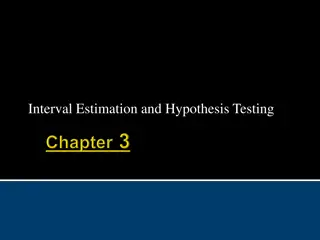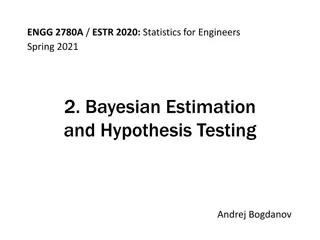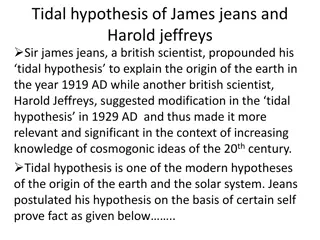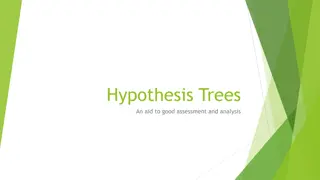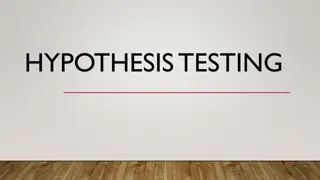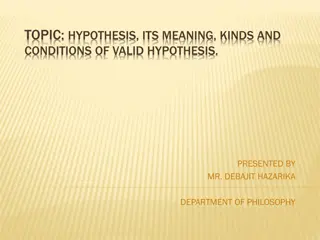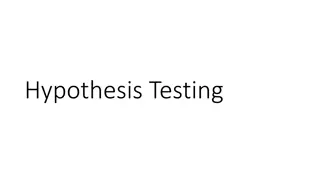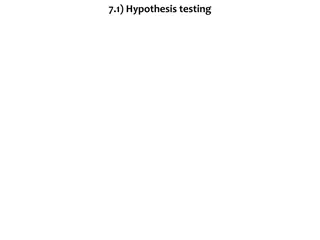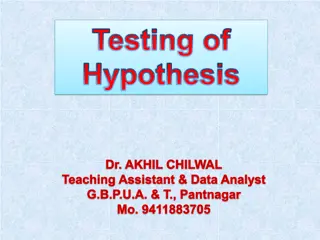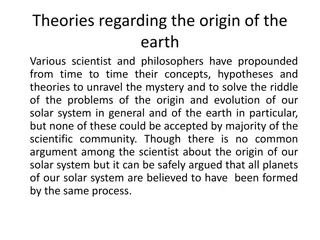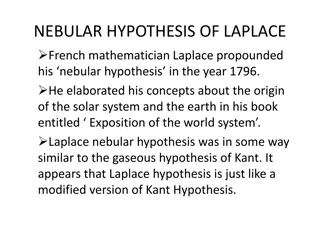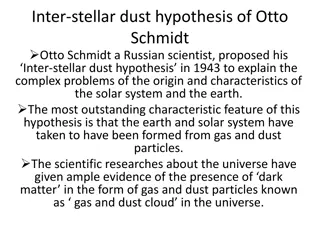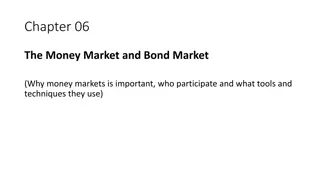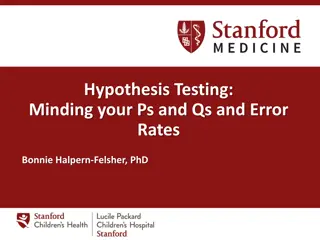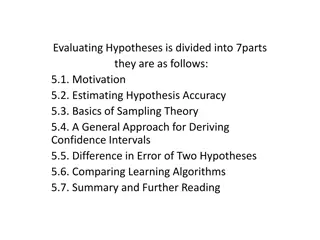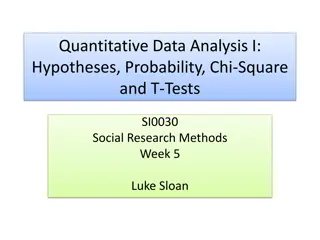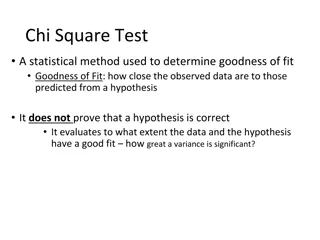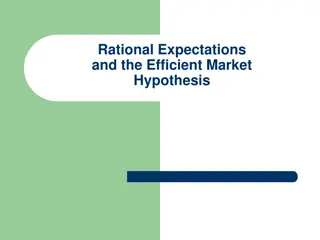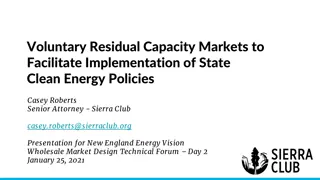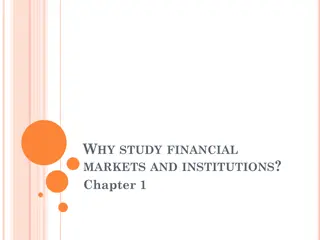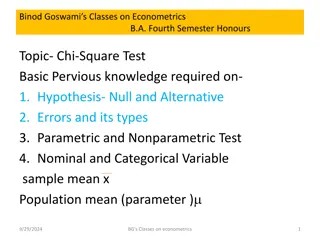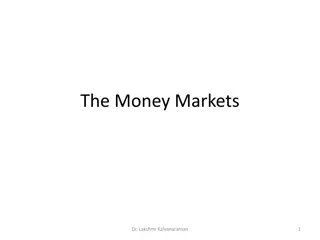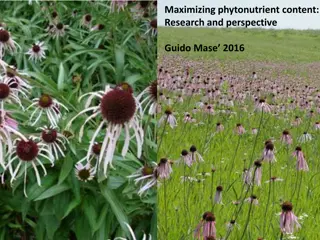Understanding Financial Markets in India
Financial markets play a crucial role in connecting lenders and borrowers, providing avenues for investment and capital generation. In India, the financial system includes money markets and capital markets, offering diverse financial products and opportunities for investors. Money markets deal with
2 views • 106 slides
Understanding Interval Estimation and Hypothesis Testing in Statistics
The concept of interval estimation and hypothesis testing in statistics involves techniques such as constructing interval estimators, performing hypothesis tests, determining critical values from t-distributions, and making probability statements. Assumptions must be met in linear regression models
0 views • 25 slides
Bayesian Estimation and Hypothesis Testing in Statistics for Engineers
In this course on Bayesian Estimation and Hypothesis Testing for Engineers, various concepts such as point estimation, conditional expectation, Maximum a posteriori estimator, hypothesis testing, and error analysis are covered. Topics include turning conditional PDF/PMF estimates into one number, es
1 views • 16 slides
Understanding Markets and Economic Structures
Markets play a crucial role in bringing buyers and sellers together for transactions. This article discusses the concept of markets, different types of markets in a capitalist economy, focusing on perfect competition. It outlines the features and conditions of perfect competition, emphasizing the im
2 views • 42 slides
The Tidal Hypothesis of James Jeans and Harold Jeffreys: Origin of the Earth
The Tidal Hypothesis proposed by British scientists James Jeans and Harold Jeffreys in the early 20th century suggested that the Earth and solar system were formed from the interaction of the Sun and an intruding star. Jeans postulated that massive gravitational forces from the intruding star caused
2 views • 5 slides
Understanding Hypothesis Trees for Effective Assessment and Analysis
Hypothesis trees offer a structured approach to analysis by identifying problems, potential causes, testing hypotheses, and reaching conclusions. They enhance evidence gathering and ensure the child's perspective is central in assessments. Utilizing stages like problem identification, cause analysis
1 views • 11 slides
Understanding Type I and Type II Errors in Hypothesis Testing
In statistics, Type I error is a false positive conclusion, while Type II error is a false negative conclusion. Type I error occurs when the null hypothesis is incorrectly rejected, leading to a conclusion that results are statistically significant when they are not. On the other hand, Type II error
0 views • 6 slides
Understanding Hypothesis: Meaning, Types, and Validity Conditions
A hypothesis is a provisional supposition used to explain a fact or phenomenon, serving as a starting point in investigations to establish causal connections. This article explores the meaning of hypothesis, different types, conditions for validity, and examples. Definitions by prominent philosopher
0 views • 22 slides
Understanding Hypothesis Testing and Null vs. Alternative Hypotheses
A hypothesis is a prediction about a study's outcome, guiding research direction. Stating hypotheses forces deep thinking and making specific predictions but may introduce bias. Null hypothesis (H0) states no effect, while alternative hypothesis (Ha) claims an effect in the population. Researchers e
0 views • 7 slides
Hypothesis Testing Examples and Scenarios
Explore various scenarios involving hypothesis testing, including coin bias, dice rolling, and election candidate support estimation. Learn to define test statistics, null and alternative hypotheses, select significance levels, and determine conditions for rejecting the null hypothesis based on samp
0 views • 9 slides
Understanding Hypothesis Testing in Statistical Analysis
Statistical analysis aims to make inferences about populations based on sample data. Hypothesis testing is a crucial aspect where decisions are made regarding accepting or rejecting specific values or parameters. Statistical and parametric hypotheses, null hypotheses, and decision problems are key c
1 views • 34 slides
Theories on the Origin of Earth and Solar System
Scientists and philosophers have proposed various theories regarding the origin of Earth and our solar system, with concepts ranging from evolutionary to catastrophic. The Dust gas cloud theory, Planetesimal hypothesis, Binary star hypothesis, and more have been suggested to explain how planets were
4 views • 7 slides
Laplace's Nebular Hypothesis: Origin of the Solar System
French mathematician Laplace proposed the nebular hypothesis in 1796, refining Kant's gaseous hypothesis. Laplace asserted a hot rotating gaseous nebula cooled gradually, contracting and increasing rotation speed. Eventually, centrifugal forces led to the formation of ring structures, contrasting wi
0 views • 6 slides
The Interstellar Dust Hypothesis of Otto Schmidt Explained
Russian scientist Otto Schmidt proposed the Interstellar Dust Hypothesis in 1943 to explain the origin of the solar system and Earth. According to this hypothesis, gas and dust particles from the universe formed our solar system. The dark matter in the form of gas and dust clouds played a crucial ro
3 views • 5 slides
Understanding the Importance of Money Markets and Bond Markets
Money markets play a crucial role in the financial system by providing short-term, low-risk, and liquid investment options. Participants include institutional investors and dealers who engage in large transactions. Money market securities have specific characteristics, such as large denominations, l
0 views • 23 slides
Understanding Hypothesis Testing in Statistics
Hypothesis testing is essential in scientific inquiry, involving the formulation of null and alternative hypotheses at a chosen level of significance. Statistical hypotheses focus on population characteristics and are tested on samples using probability concepts. The null hypothesis assumes no effec
0 views • 26 slides
Understanding Hypothesis Evaluation in Machine Learning
Evaluating hypotheses in machine learning is crucial for assessing accuracy and making informed decisions. This process involves estimating hypothesis accuracy, sampling theory basics, deriving confidence intervals, comparing learning algorithms, and more. Motivated by questions about accuracy estim
0 views • 26 slides
Science Project - Investigating the Effects of Variables on Plant Growth
Conducting a science project to explore the impact of different variables on plant growth. The project involves formulating a hypothesis, conducting background research, testing the hypothesis, and analyzing the results to draw conclusions. Detailed information on the research process, hypothesis fo
0 views • 13 slides
Understanding the Basic Science Hypothesis and Writing Techniques
Exploring the concept of the basic science hypothesis, its importance in research, and tips for effective hypothesis writing. The scientific method, historical perspectives from Karl Popper to Paul Feyerabend, and the role of serendipity in scientific discoveries are discussed.
0 views • 61 slides
Understanding Hypothesis Testing: Examples and Interpretation
This content covers various examples of hypothesis testing scenarios, including car drivers' preferences for turning directions, the effectiveness of a new drug compared to a standard treatment, and the probability of seeds germinating in a greenhouse. It explains how to formulate null and alternati
0 views • 11 slides
Understanding Hypotheses, Probability, and Statistical Tests in Social Research
This content delves into formulating hypotheses in social science, selecting statistical tests based on variables' measurement levels, understanding probability in statistical analysis, and distinguishing between null and alternative hypotheses. It emphasizes the research process involving hypothesi
5 views • 21 slides
Understanding Variables, Hypothesis, and Experimental Design
Variables play a crucial role in experiments, with the independent variable being the condition that is changed, and the dependent variable being the factor affected by the change. Control variables must remain constant. Hypothesis is an educated guess that can be tested. Explore the relationship be
0 views • 13 slides
Around the World in 80 Tosses: Introducing Hypothesis Tests
Engage students in a fun activity using an inflatable globe to introduce hypothesis testing concepts. Students make claims about Earth's surface cover, collect data by tossing the globe, and perform hypothesis tests based on the observations. Encourage critical thinking, statistical reasoning, and i
0 views • 6 slides
Understanding Efficient Markets Hypothesis in Corporate Finance
Explore the concepts of efficient markets hypothesis (EMH) and adaptive markets hypothesis (AMH) in corporate finance. EMH posits that all information is instantly reflected in stock prices, while AMH suggests a gradual process based on the number of analysts. Learn about different forms of market e
0 views • 33 slides
Understanding Chi-Square Test for Goodness of Fit
Chi-square test is a statistical method used to assess how well observed data match the predicted values from a hypothesis. It does not confirm the hypothesis but measures the extent of fit between data and the hypothesis. This test is crucial for determining the significance of differences between
0 views • 10 slides
Understanding Hypothesis Testing in Statistics
Explore the concept of hypothesis testing through an engaging scenario involving Edison light bulbs. Learn about factors influencing hypothesis testing such as variability, sample size, and sample mean. Discover the logic behind hypothesis testing using Jake's napkin dispensers example. Enhance your
0 views • 28 slides
Understanding Rational Expectations and Efficient Markets
Exploring the concept of rational expectations and its implications on the efficient market hypothesis. Learn how expectations influence various sectors and markets in the economy, including asset demand, risk assessment, information asymmetry, financial innovation, and more. The theory of rational
0 views • 51 slides
Understanding Hypothesis Testing in Statistics
Hypothesis testing is a fundamental concept in statistics that involves testing statements about population parameters. This content covers the basics of hypothesis testing, including types of hypotheses, examples, and the procedure involved in statistical hypothesis testing. It also explores the im
0 views • 23 slides
Understanding Hypothesis Testing in Statistics
This content discusses the fundamentals of hypothesis testing based on a single sample in statistics. It covers the assumptions for inference, the parts of a hypothesis test, statistical hypotheses, and provides examples of hypothesis tests and significance tests in practical scenarios. The importan
0 views • 69 slides
Implementing Voluntary Residual Capacity Markets for Clean Energy Policies
Explore the concept of voluntary residual capacity markets to support the implementation of state clean energy policies. Learn how these markets allow load-serving entities to meet capacity obligations outside traditional markets, respecting state goals and methods. Discover the workings and design
0 views • 9 slides
Understanding the Significance of Financial Markets and Institutions
Studying financial markets and institutions is crucial as it facilitates the efficient transfer of funds, promotes economic growth, impacts personal wealth, influences business decisions, and plays a significant role in determining interest rates. Debt markets, including bond markets, enable borrowi
0 views • 15 slides
Understanding Hypothesis Testing and Types of Errors in Econometrics
Hypothesis testing is vital in econometrics to evaluate statements about population parameters. The null hypothesis assumes no difference, while the alternative hypothesis offers a different perspective. Different types of errors—such as Type I and Type II errors—can occur during hypothesis test
1 views • 11 slides
Understanding Money Markets and Their Role in the Economy
Money markets are financial markets where short-term, low-risk securities are traded. Unlike banks, they offer distinct advantages such as liquidity, active secondary markets, and cost efficiency in providing short-term funds due to lower regulations. Despite the presence of banks, money markets pla
0 views • 33 slides
Understanding Dynamics of Perfect Markets in Microeconomics
Explore the dynamics of perfect markets in microeconomics through this presentation by Mrs. L. Booi. Learn about the short and long run production, cost and revenue curves, and the concepts of perfect markets and imperfect markets. Gain insights into how things behave and affect other markets in the
0 views • 23 slides
Understanding Power Markets in Nordic Countries: Insights into Day-ahead and Intraday Markets
Delve into the intricate workings of power markets in Nordic countries, exploring key terms, market pricing strategies, vRES impact, and the significance of day-ahead and intraday markets. Discover how the merit order and bidding zones influence pricing and system operations, ensuring efficient elec
0 views • 11 slides
Understanding Financial Markets: Mechanisms and Efficiency
Financial markets play a crucial role in connecting borrowers and lenders, facilitating the flow of funds for optimal allocation. Different financial phases involve borrowing, saving, and investing. Transfers of funds occur directly or through intermediaries. Efficiency in financial markets ensures
0 views • 15 slides
Understanding International Finance: Scope, Importance, and Challenges
International finance explores interactions between countries, including currency exchange rates, foreign direct investment, and risk management. The scope includes foreign exchange markets, MNC financial systems, and international accounting. It raises questions on liberalizing financial markets, I
0 views • 52 slides
Understanding Hypothesis Testing in Statistics
This content explores the concept of hypothesis testing in statistics, covering the procedures, general research questions, examples, and hypothesis design. It explains the formulation of hypotheses, decision criteria, significance levels, and the importance of testing population parameters. Various
1 views • 97 slides
Understanding Plant Chemistry and Phytonutrients: Insights from Research
Exploring the diverse world of plant chemistry, this content delves into primary and secondary metabolites, highlighting the significance of phytonutrients in maximizing nutritional content. Various hypotheses such as the Insecticide Hypothesis and Co-evolution Hypothesis are discussed, shedding lig
0 views • 61 slides
Understanding the Kinked Demand Curve Hypothesis in Oligopoly Markets
In oligopoly markets, prices often remain rigid despite cost changes. The kinked demand curve hypothesis, introduced by economist Sweezy, explains this phenomenon. It suggests that the demand curve an oligopolist faces has a kink at the current price level, with elastic demand above and inelastic de
0 views • 4 slides

